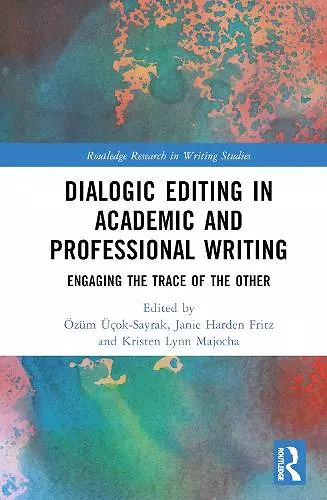Dialogic Editing in Academic and Professional Writing
Engaging the Trace of the Other
Özüm Üçok-Sayrak editor Janie Harden Fritz editor Kristen Lynn Majocha editor
Format:Hardback
Publisher:Taylor & Francis Ltd
Published:1st Dec '23
Currently unavailable, and unfortunately no date known when it will be back

This book brings attention to the communicative process of editing as a dialogic experience that is attentive to the voice of the Other and underlines an ethical turn for the editing process.
The volume focuses on an essential, yet undertheorized, aspect of the communicative practice of editing by reading and receiving the voice of the Other and offering feedback toward assisting the text to find a voice without turning it into the voice of the editor. Utilizing the theoretical and philosophical frameworks of a diverse group of leading scholars and philosophers, contributors to this volume explore the editing process as connected to communication ethics that calls for discernment of what matters.
With its philosophical underpinnings, this book will especially be of interest to researchers and students in multiple disciplines in humanities and the social sciences, including communication studies, dialogue studies, philosophy, literature, composition studies, education, history, anthropology, psychology, sociology, religious studies, and political science.
“In their wonderful volume, professors Özüm Üçok-Sayrak, Janie Harden Fritz and Kristen Lynn Majocha invite us to explore key considerations surrounding the development of a dialogic approach to editing. While this practice is too often understood as a one-way form of communication where the editor informs the authors about what should be done to improve their manuscripts, this book highlights how a form of reciprocity, alterity and polyphony can be, in fact, nurtured in this type of activity. Far from falling into a naïve conception of editing, all the authors featured in this volume acknowledge the balance of power that is irremediably involved in such a practice, but also show how this reality should not prevent editors from adopting more conversationally-oriented ways to approach their responsibilities. This volume is a must-read for whoever is interested in an editing practice where co-construction is not only possible but also valued and encouraged.” - François Cooren, Professor, Université de Montréal, Canada
“Timely as well as extremely significant, this volume thoughtfully explores the struggles and tensions at the heart of the writing-editing process—tensions that demand an ethical stance rightfully framed within the philosophy of dialogue. Offering a welcome alternative to the colonizing tendencies of editing, the contributors insightfully highlight the transformative potential inherent within the author-editor relationship through mindful attention to the voice of the Other. Using the metaphor of the voice as a central organizing frame allows the contributors a much-needed dialogic opening that enables rich hermeneutical interpretations of the editing-writing process. This book is a must-read for all academic scholars regardless of disciplinary affiliation.” - Deborah Eicher-Catt, Professor Emerita, The Pennsylvania State University, USA
“This gratifying volume of eight original essays brings a long overdue ethical turn to the widely-held but wrong-headed view that editing is simply a mundane academic chore. The original and clear-eyed premise of the book is that far from being a role-bound or onerous task, editing holds great promise as an invitational and revelatory dialogic practice for authors, editors, and ultimately, readers. Its diverse essays traverse a wide expanse of intellectual and contextual terrain to illuminate how dialogic attunement -- and its epistemic openness to alterity of all kinds -- generates deeper and more horizon expanding thought and prose in all areas of academic and professional editing – be they scholarly, pedagogical, or literary.” - Lisbeth Lipari, Professor, Denison University, USA
“On the heels of many disputes in the field of Communication about publishing and the entire publishing process, the editors of this significant volume of essays argue that the editing process must make an ethical turn by being attentive to the voice of the Other. Seeing editing as a communicative/dialogical practice, this book aims to make the process more engaged, moving beyond the mechanical frameworks to a holistic one that includes the Other. This is a must-read for both authors and editors.” - Andre E. Johnson, Professor, University of Memphis, USA
“This volume is a “must read” for editors of academic journals and books. Grounded in important communication theory and written by experienced editors, the book gives editors a framework for reflecting on their roles as editors and how to produce work that highlights and respects the voice of authors. I also recommend this book for all academic writers so that they may learn more about what to expect form editors and reflect on their how their goals as writers interact with those of editors.” - Pamela J. Lannutti, Professor, Widener University, USA
ISBN: 9781032522937
Dimensions: unknown
Weight: 453g
132 pages